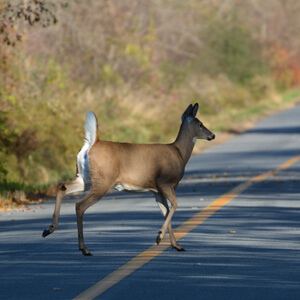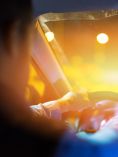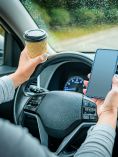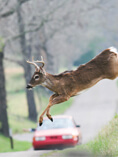Deer and Cars Don't Mix

Mention the word "deer" and you will get varied responses. Some appreciate their beauty and grace, some get angry because they ruin their gardens and landscaping, and others can't wait until deer season. Whether you appreciate deer or see them as fair game, you don't want to meet one in your car. Here's how to avoid hitting one.
Watch the Time
Have you ever noticed that you see more deer from late October through December? That's because it's their breeding season, and they are most active at dawn and dusk. Be on the lookout for them at these times, particularly if you're driving. It's also a good idea to use the bright setting on your headlights if there's no oncoming traffic.
Watch Where You Are
Ever see deer crossing signs? They are usually placed along roads in heavily wooded areas where deer sightings—and deer-car collisions—are common. You'll see them most in states with a large deer population. And remember—deer rarely travel alone. If you see one, don't be surprised if another one is close behind.
What if You See One?
If you see a deer on the side of the road, slow down. Remember—they are unpredictable. According to caranddriver.com, one long blast of your horn can frighten them away. They also recommend that you do not swerve to avoid hitting the deer. It can confuse them and they won't know where to run. Slow down or stop and let the deer run away.
What if You Hit One?
Despite your best efforts, a deer can still run out in front of you before you have time to react. If you do hit a deer, take these steps:
- Pull over to a safe spot on the side of the road and turn your hazard lights on.
- Notify the authorities. You may need a police report for your insurance claim.
- Take pictures of your car and the deer, but only if it is safe to do so.
- If the deer is in the middle of the road, don't try to move it yourself. It may not be dead and it could hurt you. In addition, you would put yourself in harm's way if there's more traffic.
- Make sure your car is drivable before leaving the scene.
Remember, driving smart and keeping an eye out is the best way to help you avoid a collision between your car and a deer. Here's to safe travels—for you and any deer you encounter!
-
Defensive Driving Tips
 Avoid Them
Avoid ThemWatching for deer is important, but so is being a defensive driver. Distractions and poor driving habits cause accidents.
-
Distracted Driving
 See Distractions
See DistractionsCell phones are a dangerous driving distraction, but there are several other distractions to be aware of too.
-
Auto Scenarios: What If
 Find Out
Find OutHitting a deer is just one of several auto accident scenarios. Do you know if your insurance would cover them?
